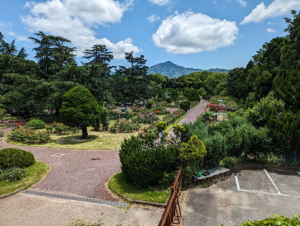2025 ‣ 80 years since the end of the war Japanese culture has a deep respect for the invisible
Yoshie Doi

Kyoto Prefectural Botanical Gardens Photographed on June 5, 2024
Yoshie Doi
I was born after the war, so I don’t know how hard it was during the war, but I have experienced it. So I thought I understood the impact of countries fighting each other. Japan ended the war in 1945, and in 2025 it will be 80 years since then. The United States was founded in 1776, and in 2026 it will be 250 years since its founding. Kyo Suzume will celebrate its 25th anniversary in 2026. It is a milestone year. It is a time that was unimaginable when it was founded in 2001.
I once read a book that described the hardships of the founding of the United States. It was beyond imagination. How did they survive when they had nothing to eat? It’s amazing how they became the world’s most powerful country in just 200 years.
Portugal was the dominant power in the 16th century, the Netherlands in the 17th century, and Britain in the 18th and 19th centuries. In the 20th century, after World War I, America dominated the world.
The UK think tank Centre for Economics and Business Research (CEBR) announced on December 26, 2024 that China’s GDP will surpass that of the US in 2037. Japan’s GDP is expected to be overtaken by India in 2025, making it the fifth largest in the world. According to the IMF, India’s estimated GDP will be $4,339.8 billion, and Japan’s $4,310.3 billion. India is expected to jump to third place, Germany to fourth, and Japan to fifth.
We looked at national power only in terms of economic figures, but there are things that are more important than the economy. A cultural minimum standard of living plus spiritual satisfaction cannot be measured in numbers. It is precisely these things that cannot be measured in numbers that are invisible to the eye, but by making them visible and tangible, we can understand them.
I think Japanese culture, and Kyoto culture, is a culture that respects things that cannot be seen with the eyes. Whether it be food, seasonings, furnishings, nature, customs, festivals, or life. I would like to start 2025 by returning to that origin.
We have had the opportunity to interact with the Kingdom of Bhutan, and King Jigme Kashmir Wangchuck arranged for us to plant a cypress tree, the national tree, at Nijo Castle as part of our support for the disaster-stricken areas.ブ
Through those exchanges, I was able to sense the richness and warmth of their hearts, which cannot be measured by GDP. In a different sense to developed countries, there is an illusion that the value of money in our economic society transcends other values, but I think 2025 will be the year we understand what is important. I welcomed the new year with a prayer for a society filled with love.
Heian-kyo in Kyoto also started with the prayer song “Heian Paradise, eternal spring.” Heian-kyo and Kyoto were capitals built based on the latest feng shui geography at the time.
Now that we are at the turning point of 80 years since the end of the war, isn’t it time to renew our good old traditions and regain our pride as Japanese people?
The word “prayer” reminds me of the time when I heard from film director Tetsu Shiratori about his experience of completely curing his illness through “prayer.” There are more than 40,000 research papers on “prayer” around the world, and he told me about research papers from around the world, including those from Harvard University.「
I also had the opportunity to meet and talk with Professor Kazuo Murakami (Professor Emeritus at the University of Tsukuba) four times when he was in good health. This world-leading professor in DNA elucidation taught me in a friendly and easy-to-understand manner.
Since ancient times, Japanese people have believed that all things, even the stalks of grass and trees, have a soul, and that they are kept alive by the blessings of nature, and that they are one life with nature. Humans are also a part of nature, so they do not conquer nature, but live with it in a “symbiotic” way.
We have lived my life thinking about something invisible to the eye, something beyond human understanding. This has been Japan’s culture since ancient times. We are proud of this uniquely Japanese culture, and I will start this year with a feeling of gratitude for everything. Thank you for your continued support.
The end of document
Translated by Masami Otani
